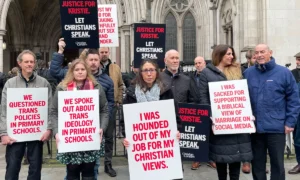Southern Baptist Delegates Endorse Ban on Same-Sex Marriage: A Call for Reversal

Introduction to the Southern Baptist Convention
The Southern Baptist Convention (SBC) is one of the largest Protestant denominations in the United States, comprising a robust network of over 14 million members across more than 47,000 affiliated churches. Established in 1845 in Augusta, Georgia, the SBC arose from a split with northern Baptists over issues including slavery. This historical context remains significant as it influences the convention’s contemporary beliefs and practices, particularly in relation to social concerns.
The SBC places a strong emphasis on biblical authority, advocating for a literal interpretation of Scripture. This principle is foundational to its teachings on various matters, including marriage and family. The convention upholds traditional marriage as a sacred union exclusively between one man and one woman, a stance reflecting its adherence to conservative evangelical values. These beliefs are articulated through the Baptist Faith and Message, a statement of faith that encapsulates the core doctrines of the denomination.
Over the years, the SBC has impacted the American religious landscape significantly, not just through its theology, but also through its involvement in social and political issues. The convention often engages in public advocacy, particularly in matters related to family values and moral conduct. The Southern Baptist Convention holds annual meetings where delegates, known as messengers, gather to discuss and vote on resolutions that shape the direction of the denomination.
Understanding the SBC’s foundational principles and its historical evolution is crucial in contemplating its recent decisions, including the endorsement of a ban on same-sex marriage. This resolution embodies the convention’s commitment to its interpretation of biblical teachings regarding marriage, further influencing its ongoing discussions about morality and societal standards. The choices made by SBC delegates reflect not only their theological perspectives but also their position within the increasingly polarized discussions surrounding marriage in contemporary America.
The Recent National Meeting
In June 2023, the Southern Baptist Convention (SBC) held its annual national meeting in New Orleans, Louisiana, which gathered over 9,500 delegates from various congregations across the United States. This assembly represented a significant convergence of church leaders and members aimed at addressing pivotal issues facing the denomination. Notably, one of the primary topics of discussion at this year’s meeting was the endorsement of a resolution that reinforces the ban on same-sex marriage, reflecting the traditional stance of the Southern Baptist community.
The atmosphere at the meeting was charged, with delegates actively engaging in discussions and debates surrounding the resolution. The Southern Baptist Convention has historically opposed same-sex marriage, and this endorsement serves to reaffirm their commitment to this position. Throughout the course of the meeting, attendees participated in spirited discussions regarding the implications of this ban, particularly on church policy and relationships with LGBTQ+ individuals and communities.
Key speakers, including prominent Southern Baptist leaders, expressed their views on how the endorsement aligns with biblical teachings and the denomination’s mission. The attendees exhibited a unifying spirit, as many voiced their support for the resolution, citing a desire to uphold traditional family values. The dialogue during the gathering highlighted the broader cultural landscape in which the convention operates, illustrating the challenges and opportunities the SBC faces in terms of maintaining its historical doctrines in a changing societal context.
Furthermore, the meeting addressed other essential topics, encompassing church planting, evangelism, and social issues impacting the faith community. The culmination of these discussions underscored the SBC’s ongoing commitment to its doctrinal beliefs while navigating contemporary challenges. Overall, the national meeting represented a pivotal moment for the Southern Baptist denomination, reflecting a collective resolve to stand firm on issues of faith and morality amidst evolving societal norms.
The Resolution on Same-Sex Marriage
The recent resolution passed by the Southern Baptist Convention (SBC) delegates signifies a formal endorsement to maintain a ban on same-sex marriage, reflecting the denomination’s long-standing theological beliefs. The language of the resolution articulates a strong commitment to traditional definitions of marriage, asserting that such unions should be exclusively between one man and one woman. The verbiage is crafted to resonate deeply with the foundational biblical texts that inform the church’s position, leaving little ambiguity about the intention behind the vote.
The rationale for this resolution is rooted in the denomination’s beliefs regarding scripture and the sanctity of marriage. Church leaders contend that they are upholding a biblical standard that has been in place since the dawn of Christianity. In their statements, they reference passages from the Bible, emphasizing the sacred nature of heterosexual unions within the Christian faith. This resolution is also seen as a response to evolving societal norms around marriage and sexuality, which some leaders perceive as threats to the integrity of church teachings.
Accompanying the resolution were several affirmations from influential church figures who underscored the importance of adhering to traditional values. These leaders expressed concerns about the implications of legalizing same-sex marriage, which they assert could undermine not only family structures but also the broader moral framework within society. In their view, preserving traditional marriage is pivotal for spiritual health and communal integrity among the faithful. This stance further solidifies the SBC’s identity as a denomination unwavering in its theological commitments, despite the growing acceptance of same-sex marriage in various cultural contexts.
Historical Context of Same-Sex Marriage Legislation
The journey toward legal recognition of same-sex marriage in the United States is deeply interwoven with broader cultural shifts and legislative efforts. The movement gained significant momentum in the late 20th century, culminating in various state-level rulings and ballot initiatives that challenged traditional definitions of marriage. However, it was the U.S. Supreme Court’s landmark decision in 2015, in the case of Obergefell v. Hodges, that fundamentally altered the legal landscape for same-sex couples. The ruling declared that same-sex marriage is a constitutional right, effectively legalizing it across all 50 states. This pivotal moment not only affirmed the legal status of same-sex relationships but also symbolized a significant victory for the LGBTQ+ rights movement.
The implications of this ruling extended beyond the legal sphere, deeply influencing religious organizations and their doctrines. Many institutions were prompted to reassess their teachings on marriage, often resulting in contentious debates among congregations and leadership. A notable case is the Southern Baptist Convention (SBC), which holds a traditional view of marriage as being exclusively between a man and a woman. The Supreme Court’s decision has led to an intensified focus on the sanctity of marriage within the SBC, as leaders and delegates grapple with the changing societal norms surrounding marriage and their theological commitments.
In response to both internal and external pressures, the SBC has often positioned itself as an advocate for preserving what it considers the biblical definition of marriage. This has manifested in formal resolutions, such as the recent endorsement by delegates to ban same-sex marriage, illustrating the ongoing tension between evolving social mores and traditional religious values. As religious organizations like the SBC navigate these challenges, the historical context of same-sex marriage legislation continues to shape their perspectives and operational frameworks.
Reactions from the Faith Community
The recent endorsement by the Southern Baptist Convention (SBC) to impose a ban on same-sex marriage has elicited a wide spectrum of reactions from different faith leaders and members across various denominations. This decision underscores the ongoing debate regarding marriage and sexuality within the Christian community, revealing both strong support and significant opposition.
Supporters of the SBC’s resolution argue that it aligns with traditional biblical interpretations of marriage. Prominent evangelical leaders have expressed their approval, stating that the reaffirmation of heterosexual marriage is essential in preserving the sanctity of the family unit. They contend that the Bible provides clear guidance on marriage, and adhering to these teachings is crucial for the moral integrity of society. Many believe that the endorsement serves as a necessary reminder of their commitment to upholding Christian values, which they view as being increasingly undermined by contemporary societal norms.
Conversely, a segment of the faith community vehemently opposes the SBC’s stance. Progressive Christian groups have voiced their disapproval, emphasizing the principles of love, inclusion, and acceptance as central to their faith. Leaders from various denominations have argued that such a ban is detrimental not only to LGBTQ+ individuals but also to the broader Christian witness, as it fosters division and alienation. They assert that love should be the guiding principle in any discussion regarding marriage and sexuality, advocating for a more inclusive understanding that honors diverse expressions of love and commitment.
This divergence in opinions reflects a significant shift in discourse within Christianity about the applicability of traditional doctrines to modern contexts. As such, the heart of the matter lies not just in biblical interpretation, but also in broader teachings about compassion, acceptance, and the role of faith in navigating complex social issues. Faith leaders continue to seek common ground, fostering dialogue that respects differing viewpoints while striving for mutual understanding.
Legal Implications of the Endorsement
The endorsement by the Southern Baptist Convention (SBC) to ban same-sex marriage raises significant legal implications that warrant thorough analysis. This endorsement signals a potential challenge to the Supreme Court’s decision in Obergefell v. Hodges, which affirmed the constitutional right of same-sex couples to marry. The feasibility of such a challenge is influenced by various factors including the composition of the judiciary, public opinion, and existing legal precedents that protect marriage equality.
One of the primary legal implications of the SBC’s endorsement is the potential for increased litigation aimed at reversing Obergefell. It is essential to understand that while the SBC can advocate for a ban on same-sex marriage, any legal action would need to navigate a complex judicial terrain. The Supreme Court’s ruling established marriage equality as a constitutional right, invoking the Equal Protection Clause of the Fourteenth Amendment. Therefore, any attempt to reverse this decision would require a compelling legal argument to convince the current Supreme Court, which may be hesitant to overturn established rights.
Furthermore, if the SBC’s endorsement translates into legislative or judicial actions that seek to undermine same-sex marriage, it could have profound implications for the rights of same-sex couples across the United States. Potential ripple effects might extend beyond marriage rights to encompass areas such as adoption, healthcare access, and employment protections. Any significant erosion of these rights may provoke legal battles, galvanizing advocacy groups aimed at protecting and expanding the rights of LGBTQ+ individuals. Consequently, the journey toward challenging Obergefell could embolden opposition movements, potentially resulting in a fragmented legal landscape where rights would vary significantly by jurisdiction.
Ultimately, the SBC’s endorsement of a ban on same-sex marriage is not merely a declarative stance; it embodies a broader legal campaign that may reverberate through the fabric of American civil rights. As these developments unfold, monitoring the evolving legal landscape will be crucial in understanding the potential trajectory of marriage equality and the rights of same-sex couples in the U.S.
Public Opinion on Same-Sex Marriage
In recent years, public opinion on same-sex marriage in the United States has witnessed a significant shift. According to various surveys and research studies, support for same-sex marriage has steadily increased over the past decade. A 2013 Gallup poll indicated that only 53% of Americans favored legalizing same-sex marriage, while by 2022, this figure had surged to approximately 70%. This rising acceptance reflects a changing cultural landscape and evolving attitudes towards LGBTQ+ rights in American society.
The demographic trends show variation in support across different age groups, with younger generations being more in favor compared to older ones. For instance, individuals within the millennial and Gen Z cohorts display higher support rates, often exceeding 80%. Conversely, older generations, including Baby Boomers and Generation X, tend to express more divided opinions, although there has been a noticeable increase in their support as well. This generational divide highlights a broader cultural shift toward inclusivity and acceptance of diverse sexual orientations.
Furthermore, this evolving public sentiment is often at odds with the stances taken by various organizations, such as the Southern Baptist Convention (SBC). The recent endorsement by delegates of the SBC to ban same-sex marriage indicates a firm adherence to traditional views contrasted with the prevailing support seen among the general American populace. While the SBC members maintain their convictions based on doctrinal beliefs, they are increasingly finding themselves in a position where their views do not reflect the changing attitudes of society at large. This disparity signifies the challenges faced by religious organizations in reconciling doctrine with contemporary public opinion.
Future of the Southern Baptist Convention
The recent endorsements by the Southern Baptist Convention (SBC) regarding the ban on same-sex marriage raise significant concerns about the future trajectory of the denomination. As the SBC solidifies its stance, it faces the substantial challenge of maintaining unity among its members. Historically, the SBC has operated as a large, cohesive body; however, the contemporary religious landscape exhibits increasing polarization on social issues, potentially leading to divisions within the denomination. The commitment to traditional views on marriage is likely to resonate with some factions while alienating others, particularly among progressive congregants.
Simultaneously, the SBC is tasked with the crucial job of appealing to younger generations, who often hold differing views on marriage and sexuality compared to their older counterparts. Research indicates that younger Christians are increasingly embracing more inclusive perspectives, which could lead to a demographic shift if the SBC continues to adopt rigid positions. The challenge lies not only in retaining these younger members but in engaging them meaningfully in the church’s mission and outreach efforts. Their participation is vital for the SBC’s long-term sustainability and growth.
The implications of these endorsements extend beyond internal unity; they may also impact the SBC’s public image and outreach strategies. As societal acceptance of diverse sexual orientations increases, the denomination risks being perceived as out of touch with contemporary values, which could hinder its missionary work and community engagement. Moving forward, the SBC will need to evaluate how its doctrinal positions align with its outreach efforts, particularly as it seeks to foster a welcoming environment for all individuals while remaining true to its theological convictions.
Conclusion and Reflection
In light of the recent decision by Southern Baptist delegates to endorse a ban on same-sex marriage, it is essential to reflect on the multifaceted dialogues concerning marriage, sexuality, and religion that are ongoing within the American social fabric. The Southern Baptist Convention’s stance underscores a significant perspective that remains prevalent among certain religious communities, emphasizing traditional definitions of marriage while assigning various implications for individuals and communities involved in same-sex relationships. This decision not only marks a pivotal moment for the denomination but also sets the stage for renewed discussions regarding the intersection of faith and LGBTQ+ rights.
The impact of such endorsements extends beyond the confines of church communities, resonating throughout broader society. It invites various responses—some in agreement, some in opposition—about what marriage should represent in contemporary America. The dialogue is critical, as it provides an opportunity for individuals from differing viewpoints to engage in civil discourse. These conversations can bridge gaps between polarized factions, fostering understanding and respect, even amid deeply held beliefs.











Leave a Reply
You must be logged in to post a comment.